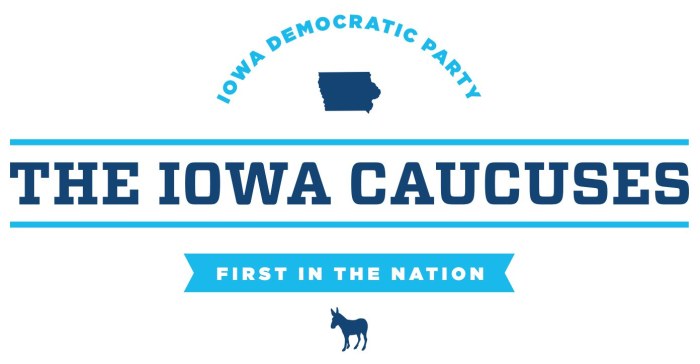The Iowa Democratic Party’s plan to allow Iowans to participate in the 2020 caucuses by phone is in doubt, due to concerns hackers could compromise the system.
Josh Putnam, who runs the Frontloading HQ website, was first to report on Twitter that the Democratic National Committee’s Rules and Bylaws Committee did not find Iowa’s proposed rules package to be in conditional compliance during an August 22 meeting. Putnam tweeted on August 23 that “cybersecurity concerns” prompted the delay for Iowa, as well as for Alaska and Nevada, which also have proposed “online components” for their 2020 caucuses.
Bloomberg’s Tyler Pager shed more light on the subject in an August 24 scoop:
At a closed-door session of the Rules and By-Laws Committee on Thursday [August 22], the DNC told the panel that experts convened by the party were able to hack into a conference call among the committee, the Iowa Democratic Party and Nevada Democratic Party, raising concerns about teleconferencing for virtual caucuses, according to three people who were at the meeting. […]
The test and the revelation of hacking enraged party officials in caucus states who say the systems were not fully built and the hack of a general teleconferencing system is not comparable. The state party officials also said they were continuing to address any potential vulnerabilities as they build the system.
Caucus-state officials offered a litany of complaints: That the DNC created the rules about absentee participation without considering how the states should achieve that goal; that the DNC offered little help in devising a virtual system, what state officials called the most significant change in caucus procedure since modern caucuses began in 1972; and were slow to raise concerns about security.
Iowa Democratic Party officials have not yet announced which vendors will be involved with the virtual caucus. Earlier this year, state party chair Troy Price and executive director Kevin Geiken indicated that several vendors would handle different aspects of the process and that the party would prioritize security considerations in building and testing the system.
Democrats who caucus in person on February 3, 2020 will write down their choices on paper, allowing a recount if necessary to check the results. But no paper component is planned for the virtual caucus as conceived in the rules package the state party approved this spring. Caucus-goers will have six windows to call in and register up to five choices for president, beginning on January 29 and ending on February 3. The party will not release any numbers from call-in sessions until after all six have been completed.
Hackers would have an obvious incentive to alter the results from the call-in sessions and could potentially gain advantages from accessing the virtual caucus data early, even without without changing it.
Pager reported,
DNC members and party officials say the committee’s final decision about the future of virtual caucusing could come within a week. It is unclear how states would fulfill the requirement to have absentee participation if the virtual caucus plans are scrapped. If the state parties are granted a waiver to ignore the requirement, it could create intense backlash.
“We’re continuing the conversation with the DNC and we look forward to them being full partners with us in our caucuses,” said Kevin Geiken, the executive director of the Iowa Democratic Party. He declined to comment on the ongoing conversations between the state party and the DNC.
I don’t know what plan B might look like, but giving Iowa or other states a waiver to abandon the virtual caucus would be a huge mistake. For decades, large numbers of politically engaged Iowans have been excluded from participating in their precinct caucuses because of a disability or work or family obligations.
Though the current plan has flaws–in particular, limiting the virtual caucus to about 9 percent of the statewide delegates–the system would still be a big improvement. The DNC was right to demand that parties create some opportunity for absentee participation. The Iowa Democratic Party must find some way to honor its commitment to make the 2020 caucuses more inclusive.
UPDATE: Some readers have suggested absentee ballots would be a good alternative to call-in caucuses. When the Iowa Democratic Party rolled out the new caucus plan in February, I asked Price why they weren’t seeking to allow Iowans to send in absentee ballots. He said they’d ruled out that approach for three reasons:
Democratic leaders in caucus states that allowed absentee ballots in 2016 described “challenges” with that system. It would not be possible to do a ranked-choice ballot in Iowa utilizing the optical scanner machines currently in use here. “They are not equipped to do so. We’ve talked to county auditors about that,” Price said. Absentee ballots would be far more costly.
Price also mentioned “preserving the spirit of the caucuses,” which I understood to mean that Democratic leaders worry New Hampshire Secretary of State Bill Gardner would view an absentee ballot system as too much like a primary.


1 Comment
Black Box Voting
I’m glad to see skeptics emerge regarding this remote vote scheme. A surprise result in the absentee caucus would guarantee claims that it had been hacked. How could the charge be disproved?
I was at least glad that the absentee plan did not require much of the county parties. A more complicated system than our famous caucus math would just make it harder to find local precinct chairs.
Months ago Bradblog was warning of this development, but thanks to Blomberg and you for telling us it has actually happened. Bradblog’s credibility improves as a result.
The absentee requirement will yet be the death of the Iowa caucus.
iowavoter Sun 25 Aug 2:39 PM